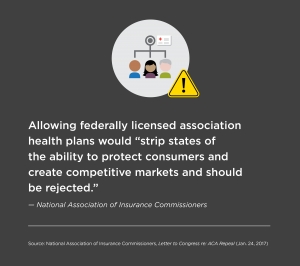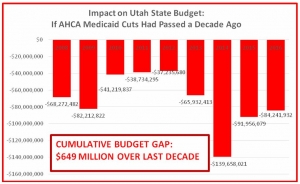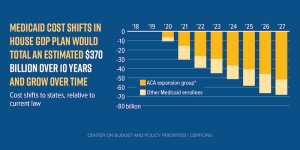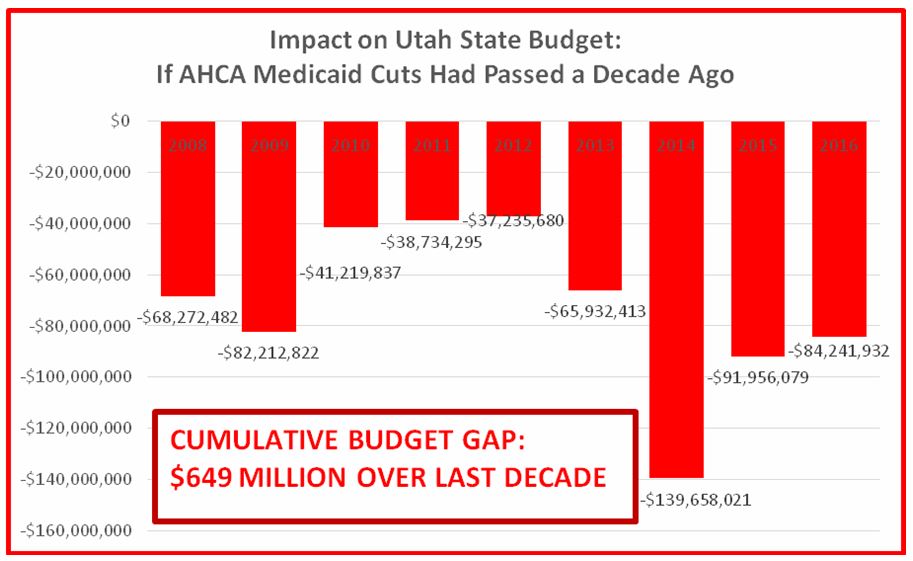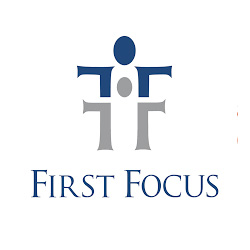Health
2017 Measures of Child Well-Being in Utah and the National Annie E. Casey Data Book Released
Voices for Utah Children recently released our annual data book Measures of Child Well-Being in Utah along with the National Annie E. Casey Data Book. These annual publications provide citizens, advocates, community leaders and policymakers with the most timely and comprehensive data regarding the health and well-being of Utah's children. Combined, these publications provide a look at how Utah compares to the rest of the nation, as well as a more in-depth picture of child well-being at the county level. Used together, these data books are a reliable source for accurate information that can help shape priorities and policies to improve the well-being of Utah's children.
If we had a crystal ball that told us how our children would be doing two, five, or ten years down the road we could make thoughtful, calculated policy decisions. To make plans for an increasing number of children it is imperative that we have good data on how children have fared in the past and how that compares to today. That is one of the basic premises of the KIDS COUNT Project - provide accurate, accessible data to make sure the future that is “just around the corner” is a positive one for all of Utah’s children.
One of the things we know about children in Utah is that there will be more of them in the future. Population estimates from the U. S. Census Bureau indicate that the number of children in Utah in 2011 was 882,354. By 2015 that number had risen to 912,496. By 2050, the Utah Governor’s Office of Planning and Budget projects that Utah’s child population will be well over a million at 1,388,651. With an expanding child population, it is important to understand what the needs are today so we can plan for tomorrow. So how are the children doing?
According to the National Data book, improvements have been achieved across almost all key areas of well-being for children. The state is ranked seventh nationally in overall child well-being, landing in the top ten for both child economic well-being and family and community context. This data points to the fact that children in Utah are benefiting from state policies aimed at helping them succeed.
Boosted by the Children’s Health Insurance Program (CHIP), Medicaid and a push for outreach, Utah has dramatically increased access to health insurance for children: Between 2014 and 2015, 20,000 fewer children lacked coverage. This progress has helped Utah recover from a fall to 27th place in child health last year, and the state now ranks 19th nationally. However, at 7%, the percentage of children without insurance is still above the national average and more can be done to provide kids with the health and security proven to better position them for success later in life.
The annual KIDS COUNT Data Book uses 16 indicators to rank each state across four domains — health, education, economic well-being and family and community — that represent what children need most to thrive. Utah ranks:
- 5th in economic well-being. At 20 percent, Utah has one of the nation’s lowest percentages of children who have no parent with full-time, year-round employment. However, the percentage of children living in poverty remained unchanged at 13 percent between 2014 and 2015.
- 15th in education. The state saw decreases in the percentage of eighth graders scoring below proficient in math, fourth graders who were below proficient in reading, and in the number of 3- and 4-year-olds not attending school.
- 3rd in the family and community domain. Just 5 percent of children in Utah live in high-poverty areas, which is well below the national average of 14 percent. The teen birth rate has fallen to 18 births per 1,000 females.
- 19th in health. The percentage of teens abusing drugs and alcohol remained at 5 percent for the third consecutive year. The child and teen death rate also hovers at the national average of 25 deaths per 100,000 children.
Along with critical gains in health, the 2017 Data Book shows that investments in early childhood education are paying off. Utah exceeds the national average for its percentages of fourth graders meeting proficiency in reading, eight graders meeting proficiency in math and high schoolers graduating on time. Utah also saw a decrease in the percentage of children ages 3 and 4 who are not in school, a trend that is likely to continue as positive policies such as SB 101 — which makes it possible to offer scholarships for quality preschool to families living in intergenerational poverty — are implemented. Positive policies such as this will have profound impacts on children’s lives.
Supplementing the National Data Book is Measures of Child Well-Being in Utah, an annual publication from Voices for Utah Children that presents county-level data to local policymakers and planners. Measures of Child Well-Being in Utah also provides information at the state-level on racial and ethnic disparities and it highlights emerging trends. In Utah, child death rates, suicide rates, and chlamydia rates are all on the rise. While the percentage of uninsured kids has been improving, this indicator will be affected by future policy decisions around Medicaid and CHIP.
Measures show that the percent of kids in poverty in Utah has declined slightly but there are differences depending on where you live and if you are a child of color. Statewide, almost 13% of kids live in poverty, around 116,000 children. However, 25% of Latino/a children live below the poverty level and county poverty levels range from a low in Morgan of 5.3% and a high of 31.9% in San Juan County.
Education data in Measures indicates that, once again, more children are enrolled in our schools than the year before. From Fall of 2015 to Fall of 2016 enrollment increased by 11,680 students. And this yearly increase is a common occurrence.
The Utah KIDS COUNT Project is funded by the Annie E. Casey Foundation whose primary mission is to foster public policies, human-service reforms, and community supports that more effectively meet the needs of today’s vulnerable children and families. By providing policymakers and citizens with benchmarks of child well-being, KIDS COUNT seeks to enrich local, state, and national discussions of ways to secure better futures for all children. It is intended to gauge the seriousness of the problems facing children, and to guide the policy trends and goals on behalf of children. Using these two publications together, KIDS COUNT can measure child outcomes and contribute to public accountability for those outcomes.
For 30 years now, Voices for Utah Children has called on our state, federal and local leaders to put children’s needs first. But the work is not done. The children of 30 years ago now have children of their own. Too many of these children are growing up in poverty, without access to healthcare or quality educational opportunities.
How can you be involved?
Make a tax-deductible donation to Voices for Utah Children—or join our Network with a monthly donation of $20 or more. Network membership includes complimentary admission to Network events with food, socializing, and opportunity to meet child advocacy experts. And don't forget to join our listserv to stay informed!
We look forward to the future of Voices for Utah Children and we hope you will be a part of our next 30 years.
Special thanks to American Express, our "Making a Difference All Year Long" sponsor. 
In the last several years, Utah has engaged in a coordinated, statewide effort to increase developmental screenings for children ages 0-5. Developmental screenings allow health care providers to assess a child's health and development. Through periodic, age-appropriate developmental screenings, providers can tell if a child is on track developmentally or if there are delays. The earlier a delay is identified, the earlier a child can be treated, and the more likely providers can intervene and prevent a delay from escalating.
Utah is at the forefront of efforts nationwide to increase developmental screenings. Through coordinated efforts at the Utah Department of Health, as well as partners at the United Way, Help Me Grow Utah and state Baby Watch Early Intervention (EI) offices, among others, Utah has seen a significant increase in the number of children getting their age- appropriate developmental screenings.
In Utah, the number of completed developmental screenings has increased by almost 40% in the last two years.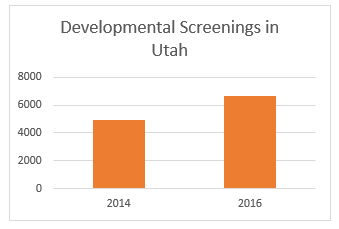
Current federal proposals to cap or block grant Medicaid are directly at odds with efforts here in Utah to expand kids’ access to developmental screening, well-child visits and early intervention. As more children from all income brackets receive their age-appropriate developmental screenings, we can expect to see more children, including children on Medicaid, needing appropriate follow- up early intervention and treatment. If Utah receives a Medicaid block grant or per enrollee amount, this fixed allocation will not support Utah’s efforts to expand statewide developmental screenings.
These are critical investments we should be making in our children. Screening children in early childhood saves families, our health system and our state money in the future. Caps or cuts to Medicaid could lead to thousands of low-income children unable to get the care and treatment they need, following their screening. This is particularly critical because low income children, many of whom are on Medicaid, are twice as likely to experience developmental delays as their higher-income peers. Poverty -associated trauma and toxic stress can exacerbate developmental delays and compromise social- emotional health.[1]
In addition, federal proposals to cap or cut Medicaid could affect Utah’s developmental screening initiative in several others detrimental ways:
- A block grant or per capita cap proposal threatens Medicaid’s Early Periodic Screening, Diagnosis and Treatment (EPSDT) benefit. The EPSDT benefit ensures that a Medicaid-enrolled child who is identified as having a developmental delay is covered to receive the appropriate treatment and therapies, as determined by his or her provider. Changes at the federal and state level threaten to replace the EPSDT benefit with a more restricted benefit package, which could limit the treatment and care children in Medicaid can receive.
- Finally, a block grant or cap also threatens Baby Watch Early Intervention Services (EI). Early Intervention is a critical link in the system of care for children with special health care needs. Many children who are identified as having a delay during a developmental screening will be referred to Early Intervention for follow-up care. A cap or cut to Medicaid puts the Early Intervention program at risk.
In Utah, we value strong and thriving families. Our state and community leaders should be lauded for improving developmental screening rates and increasing access to early care and intervention services. Instead, their progress could be reversed through Medicaid block grants or per capita caps.
________________________________________
[1]School Readiness Matters: The Campaign for Grade Level Reading: http://gradelevelreading.net/wp-content/uploads/2014/06/School-Readiness-Matters-Research-Confirms-and-Citations-r2_KC.pdf
U.S. Department of Health and Human Services. (2014). Birth to Five: Watch Me Thrive. Washington DC: Administration for Children and Families. http://www.acf.hhs.gov/programs/ecd/watch-me-thrive
Center on the Developing Child. (2014). Key Concepts: Toxic Stress. Cambridge, MA: Harvard University. http://developingchild.harvard.edu/key_concepts/toxic_stress_response/
As Congress continues to debate changes to the ACA and our health care system, the health and well-being of millions of individuals and families remain at stake. A new report highlights the need for continued access to high-quality health insurance products, from the perspective of consumer advocates. The report, released by National Association of Insurance Commissioners Consumer Representatives, reviews the likely impact of proposed ACA repeal placement plans on consumers and state insurance markets. The report discusses:
- What consumers want when it comes to private health insurance;
- The progress that has been made in reducing the uninsured rate since 2010 and the risks of full or partial repeal of the Affordable Care Act;
- Key principles—such as insuring the same number of consumers with the same quality of coverage and minimizing market disruption—that we urge policymakers to apply when considering further changes to the market; and
- Concerns about the impact of potential changes on consumers and state markets, with an emphasis on high-risk pools, continuous coverage requirements, high-deductible health insurance products, association health plans, the sale of insurance across state lines, the loss of essential health benefits protections, and the need for continued nondiscrimination protections.
As a national NAIC Consumer Representative, Lincoln Nehring was one of the contributing authors on the report. The report urges Federal and State leaders to ensure that all consumers have continued access to quality, affordable health insurance. The full report, The Need for Continued Consumer Protections and Stability in State Insurance Markets in a Climate of Federal Uncertainty is available here: ![]() NAIC Report April 2017
NAIC Report April 2017
For 30 years now, Voices for Utah Children has called on our state, federal and local leaders to put children’s needs first. But the work is not done. The children of 30 years ago now have children of their own. Too many of these children are growing up in poverty, without access to healthcare or quality educational opportunities.
How can you be involved?
Make a tax-deductible donation to Voices for Utah Children—or join our Network with a monthly donation of $20 or more. Network membership includes complimentary admission to Network events with food, socializing, and opportunity to meet child advocacy experts. And don't forget to join our listserv to stay informed!
We look forward to the future of Voices for Utah Children and we hope you will be a part of our next 30 years.
Special thanks to American Express, our "Making a Difference All Year Long" sponsor. 
National Children's Organizations to Congress: Do No Harm
Dear Majority Leader McConnell, Speaker Ryan, Minority Leader Schumer, and Minority Leader Pelosi:
As organizations from every state and multiple fields dedicated to improving the well-being of children, we strongly urge you to keep the unique needs of children front and center and adopt a “do no harm” standard for children as you consider any changes to the nation’s health care system. Today, ninety-five percent of children in the United States have health coverage – an historic high – thanks in large part to the Affordable Care Act (ACA), Medicaid and the Children’s Health Insurance Program (CHIP). We must continue to move forward, not backwards for children, their parents and pregnant women. Preserving and expanding child appropriate health coverage and access to quality care for children with special needs in school or in other child-serving systems will impact children’s opportunities to succeed. Unfortunately, the American Health Care Act would move children backwards.
To meet the “do no harm standard” for children, we stand united in urging you and the full Congress to:
- Preserve and protect Medicaid’s funding structure that guarantees poor and low-income children and children with disabilities coverage for the services and treatment they need to survive and thrive. Reject the per capita cap proposed for Medicaid in the American Health Care Act that will over time deny children critical care and disadvantage them throughout their lives. Any change to Medicaid disproportionately affects children, who constitute nearly half of Medicaid recipients – 37 million today. Over time the cap will also harm Medicaid’s comprehensive prenatal care for income eligible pregnant women in every state, including many high-risk pregnancies and coverage for nearly half of all births annually in the U.S. Medicaid also helps schools, child welfare agencies and other child serving systems get children the special help they need. All of this will be in jeopardy. Capping Medicaid spending does not create cost efficiencies; instead, it shifts costs from the federal government to states, counties, local communities, beneficiaries and providers. Such cost shifts will inevitably result in loss of or limits on health coverage for children and other vulnerable populations.
- Protect the ACA’s Medicaid expansion and continue coverage for low-income parents. More than 11 million low income adults in 31 states and the District of Columbia are benefitting from expanded Medicaid under the ACA. Covering parents improves children’s access to health insurance and health care. The Medicaid expansion has resulted in improved access to mental health and substance abuse treatment, especially critical now with the opioid crisis affecting families across the country. When parents get treatment for their own health and mental health problems, it strengthens children’s developmental outcomes. The requirement for mental health and other essential health benefits for these parents will be eliminated if the American Health Care Act moves forward.
Investing in the health of children through consistent affordable health coverage yields a significant return on investment. Identifying and treating conditions early, before they become expensive long-term liabilities, is effective. Children with health coverage are more likely to attend school, graduate from high school, go to college, and become healthier adults, with higher taxable earnings than uninsured children. Ensuring children and their parents have access to the medically necessary services they need from providers trained to serve children is critical to positive outcomes. Medicaid helps child-serving systems ensure children quality health care:
- Early Childhood: Quality health coverage and care are essential for healthy brain development in children’s early years, the years of greatest brain development. Early childhood teachers can help children learn and develop, but need help to provide the basic early intervention services children with special needs require to thrive. The ACA and Medicaid also help child care providers and other caregivers get health coverage to keep themselves healthy and able to care for others’ children.
- Education: Since child health impacts educational attainment, any structural changes to Medicaid or loss of ACA coverage would compromise returns on major investments in children from Early Head Start to college. Medicaid reimburses schools for services delivered to children and the specialized staff who provide them, especially for children with disabilities, and also for students who get critical health services at school, such as vision and hearing screenings.
- Child Welfare: Medicaid offers treatment for substance abuse and mental health disorders that can otherwise result in children entering the child protection system and keeping them there. It helps state and local agencies get treatment to children in foster family homes, children with special needs in residential treatment, children who move from foster care to guardianship, and those with special needs adopted from foster care. It also provides therapeutic case management, co-location of health experts in child welfare offices, services and treatment for children in foster care with multiple complex needs and often their parents that help shorten their stays in foster care and reunite families.
- Juvenile Justice. While Medicaid cannot be used to care for youth in detention, it is an essential sometimes life-saving support for some youths with significant health or mental health needs as they transition out of detention and return to their family and community. It can help strengthen communities by preventing juveniles from re-offending.
We call on you and your colleagues in Congress to protect children’s health coverage as you consider the American Health Care Act and any reforms to the ACA and Medicaid. Any changes that move backwards and make children worse off by depriving them of comprehensive and affordable child-appropriate coverage will jeopardize not only their futures but the nation’s future economic and national security. We urge you to commit to build on the progress made over the past five decades to expand and improve health coverage for children, and, at a minimum, to “do no harm.”
Sincerely, Voices for Utah Children and other National Organizations
For a complete list of signing organizations, see the printer friendly versions:
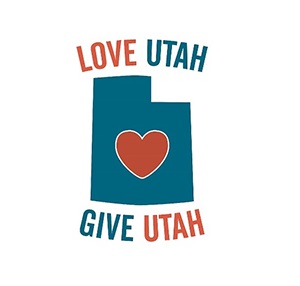 March 30, 2017 is Love UT Give UT!
March 30, 2017 is Love UT Give UT!
It’s a day for Utahns to give to the nonprofits that make Utah special. Every donation to Voices for Utah Children through Love UT Give UT gives Voices a chance to win matching grants and prizes—and gives you a chance to win a car!
And you don't have to wait! Donate now at http://bit.ly/loveUTchildren.
For 30 years now, Voices for Utah Children has called on our state, federal and local leaders to put children’s needs first. But the work is not done. The children of 30 years ago now have children of their own. Too many of these children are growing up in poverty, without access to healthcare or quality educational opportunities.
How can you be involved?
Make a tax-deductible donation to Voices for Utah Children—or join our Network with a monthly donation of $20 or more. Network membership includes complimentary admission to Network events with food, socializing, and opportunity to meet child advocacy experts. And don't forget to join our listserv to stay informed!
We look forward to the future of Voices for Utah Children and we hope you will be a part of our next 30 years.
Special thanks to American Express for sponsoring our 30th Anniversary Year. 
Save Medicaid Utah, a coalition whose members include AARP Utah, the Disability Law Center, Utah Family Voices, the Utah Health Policy Project, and Voices for Utah Children, has formed to advocate for preserving and strengthening Medicaid at a time when its viability is under attack in Congress. At stake is the health, well-being, and quality of life of over 320,000 individuals and working families in Utah – including more than 198,000 children, almost 16,000 seniors, and over 34,000 persons with disabilities.
“Medicaid supports our most vulnerable friends, neighbors, and family members,” says Micah. Vorwaller, Health Policy Analyst and Legislative Counsel with the Utah Health Policy Project. The Congressional Budget Office estimates the American Health Care Act (AHCA) will cut $880 billion from Medicaid over the next decade. As a result, some 14 million Americans will likely lose access to quality and affordable care over the same period. “With that size of a cut, many poor Utahns will undoubtedly lose coverage,” Vorwaller said. The House plans to vote on the legislation sometime tomorrow, March 23rd.
In addition to the cuts directly related to this drastic funding loss, the AHCA undermines the successful 50-year state and federal partnership underlying Medicaid. The partnership has meant that, in good times and bad, the federal government has covered about 2/3 of the cost of care for eligible Utahns. However, a Voices for Utah Children analysis found that, if the caps or block grants proposed in the bill had been in place for the last 10 years, Utah would be facing an estimated $650 million shortfall today.
Such a prospect is especially scary for parents of the thousands of children who would lose their comprehensive benefits under the existing program. Gina Pola-Money, Director of Utah Family Voices, notes, “Many families of children with special health care needs have private health insurance but still have to utilize Medicaid for their unmet needs.” Similarly, Jessie Mandle, Senior Health Policy Analyst with Voices for Utah Children, emphasizes that, “Medicaid is the cornerstone of children’s health coverage; any cuts, block grants or caps will undermine the health and well-being of Utah children and families.”
Danny Harris, Associate State Director of Advocacy for AARP Utah, contends, “Providing a fixed amount of federal funding, as envisioned by the AHCA, could shift overwhelming costs to Utah taxpayers and families, who would be unable to shoulder the costs of care, harming some of Utah’s most vulnerable citizens at a time when their needs are increasing.” Faced with scarce resources and tough choices, the state may be tempted, or forced, to provide only bare-bones care to as few individuals as possible. Disability Law Center Public Policy Advocate, Andrew Riggle, worries, “We could see a rapid return to the dark days of mass institutionalization if services designed to help keep individuals in their home or community or be as independent as possible – like outpatient mental health care, group homes, in-home nursing, or personal care supports – disappear.”
Save Medicaid Utah encourages its constituencies to ask their representatives to oppose the AHCA, and to hold them accountable for their vote.
###
See printer friendly version:
![]() AHCA Could Have Deadly Consequences for Utah’s Most Vulnerable
AHCA Could Have Deadly Consequences for Utah’s Most Vulnerable
 March 30, 2017 is Love UT Give UT!
March 30, 2017 is Love UT Give UT!
It’s a day for Utahns to give to the nonprofits that make Utah special. Every donation to Voices for Utah Children through Love UT Give UT gives Voices a chance to win matching grants and prizes—and gives you a chance to win a car!
And you don't have to wait! Donate now at http://bit.ly/loveUTchildren.
For 30 years now, Voices for Utah Children has called on our state, federal and local leaders to put children’s needs first. But the work is not done. The children of 30 years ago now have children of their own. Too many of these children are growing up in poverty, without access to healthcare or quality educational opportunities.
How can you be involved?
Make a tax-deductible donation to Voices for Utah Children—or join our Network with a monthly donation of $20 or more. Network membership includes complimentary admission to Network events with food, socializing, and opportunity to meet child advocacy experts. And don't forget to join our listserv to stay informed!
We look forward to the future of Voices for Utah Children and we hope you will be a part of our next 30 years.
Special thanks to American Express for sponsoring our 30th Anniversary Year. 
Protect Utah Kids. Protect Medicaid
Testimonies from Utah Parents
Children will lose access to coverage and care because of Medicaid cuts in the ACA Repeal Bill.
The ACA Repeal bill proposes to slash $880 billion in Medicaid funding. These cuts and caps would decimate the Medicaid program and lead to:
- Thousands of Utah children without health coverage
- Cutbacks to critical health services & benefits for children, people with disabilities and seniors
- Limited access to needed medical care
Currently 63% of all Utah Medicaid enrollees are kids, over 200,000 children. Under the current Medicaid program, children have guaranteed comprehensive protections to make sure they can access the health care they need. These protections include a comprehensive benefit package known as Early Periodic Screening, Diagnosis and Treatment (EPSDT), which ensures that if a child is diagnosed with a condition, she or he can get the affordable treatment they need.
But Medicaid cuts in the ACA bill could eliminate EPSDST benefits, and rollback eligibility so thousands of children would lose Medicaid coverage. Medicaid reductions would lead to shortfalls in state budgets; states would be forced to cut benefits to kids, roll back eligibility, increase cost sharing, and deny children the comprehensive care they need to thrive.
We can’t let this happen. For over 50 years, Medicaid has provided foundational coverage to low-income children and children with disabilities. It is the safety net for families who have fallen on hard times and a crucial lifeline of support for families with children who have special health care needs.
Here is what some working Utah parents are saying about Medicaid:
“It would be very hard to get the necessary medical exams and treatment [without Medicaid]. But thank goodness we do.” – E., SLC
[Without Medicaid] we would have to go to emergency room.”
[Without Medicaid] we would be in trouble with medical bills.” – S. , Tooele
“Gave me piece of mind knowing I could take [my son] to the doctor if needed.” -T., West Valley City
[Medicaid] has helped us through 4 babies… it’s very stressful not having insurance because there’s always the feeling of ‘what if.’ – B., SLC
“With Medicaid, I know my kids will be ok.” -E., Herriman
“[Medicaid coverage] provided me with information and opportunities that I would not otherwise know about.” – S., Sandy
“[Medicaid] helped me while I was pregnant and helped me keep my son up to date with everything the first year.” –L., Kearns
“[Medicaid coverage meant] Just knowing I could get help when I needed it through my pregnancy.” -A., SLC
“Medicaid help[ed] my family excellent[ly] because now they have excellent health.” – M., West Valley City
Tell your Congressional Representative to oppose cuts and caps to Medicaid.
The health and well-being of Utah kids are at stake.
Rob Bishop
Jason Chaffetz
Mia Love
Chris Stewart
 March 30, 2017 is Love UT Give UT!
March 30, 2017 is Love UT Give UT!
It’s a day for Utahns to give to the nonprofits that make Utah special. Every donation to Voices for Utah Children through Love UT Give UT gives Voices a chance to win matching grants and prizes—and gives you a chance to win a car!
And you don't have to wait! Donate now at http://bit.ly/loveUTchildren.
For 30 years now, Voices for Utah Children has called on our state, federal and local leaders to put children’s needs first. But the work is not done. The children of 30 years ago now have children of their own. Too many of these children are growing up in poverty, without access to healthcare or quality educational opportunities.
How can you be involved?
Make a tax-deductible donation to Voices for Utah Children—or join our Network with a monthly donation of $20 or more. Network membership includes complimentary admission to Network events with food, socializing, and opportunity to meet child advocacy experts. And don't forget to join our listserv to stay informed!
We look forward to the future of Voices for Utah Children and we hope you will be a part of our next 30 years.
Special thanks to American Express for sponsoring our 30th Anniversary Year. 
The Wild Bunch: Kids’ Health Legislation in the 2017 Session
First there was the “The Good, the Bad and the Ugly” recap of the 2015 Legislative Session. In 2016, we brought you “The Magnificent Seven.” In keeping with the Western movie-themed recap of kids’ health bills, for 2017 we bring you:
“The Wild Bunch”,
a nod to Sam Peckinpah’s classic:a gritty gang of bills that made it through, and others that were lost in the fight…
Improving access to health coverage and care:
Several bills and appropriation requests were introduced that would expand children’s access to care or coverage including…
Wins for kids’ oral health care access! Senator Christensen (R-Ogden) sponsored SB 51, which would return Medicaid managed care services to a fee for service model. Ultimately, this bill was decided outside of legislation, however, the agreement reached will help more children access a Medicaid pediatric dentist or school-based preventive dental care. To further monitor the issue, Senator Escamilla (D-Salt Lake City) sponsored intent language that directs the Department of Health to investigate pediatric dental care access issues kids enrolled in Medicaid may experience (SB 2).
In addition, the Department of Health announced this Legislative Session that they will be moving forward on expanding parents’ access to Medicaid, starting in the new fiscal year (July 2017). Initially included in last year’s bill, HB 437 (Representative Dunnigan, R-Taylorsville), parents below 60% FPL can now access Medicaid coverage (SB 7). Unfortunately, other coverage priority issues, including 12-month continuous eligibility for children on Medicaid, did not receive a funding appropriation this session. Thank you, Representative Ward for championing this important issue!
Greater focus on early childhood and maternal health:
This session, we saw several bills that expand new mothers’ access to care, while also strengthening early childhood services and care. Representative Redd sponsored HB 122 which would expand new moms’ access to Medicaid mental health services. Unfortunately, this bill did not advance, but we look forward to robust conversation about maternal health during Interim!
Medicaid funding for expanding family planning Services (HB 57, Representative King, D- Salt Lake City) was another budget item that did not receive funding, despite broad support from the Governor, Representative King, and other legislators. This appropriation would have helped individuals in the coverage gap access family planning services, and be more emotionally and financially-prepared for a newborn. Family planning services can also help women avoid risky pregnancies or other health complications. We will be supporting this important funding item again in the future.
We will also continue to support Family Medical Leave. Representative Pitcher (R-Ogden) sponsored HB 242, which would expand the number of small businesses required to offer unpaid leave to their employees, ensuring that more families could take advantage of the Family Medical Leave Act.
But there were other wins for new moms and babies including much-needed funding support for Early Intervention Services/Baby Watch (Senator Luz Escamilla, D- Salt Lake City, SB 2) and SB 135 which will strengthen statewide, evidence-based home visiting programs for low-income mothers by conducting a study and creating a restricted account (Senator Escamilla).
In addition, Senator Ann Millner sponsored SB 100, which directs the Department of Workforce Services to assess and strengthen early childhood services and supports. Both SB 100 and SB 135 will improve services for new moms and babies in the future.
Protecting Families from Burdensome Medical Expenses:
Several of the bills we supported would enhance consumer and family protection. Representative Dunnigan (R-Taylorsville) was a dedicated champion of HB 395 that would help consumers avoid surprise medical bills in an emergency room setting. This bill also included other important protections for consumers to assure that they can access adequate provider networks, without having to travel too far or wait too long to see a provider. It would also strengthen health insurance provider directories to make sure that consumers have access to accurate and up-to-date provider information. While this bill ultimately did not move forward, it sparked greater awareness and conversation about the issue of surprise medical bill that will continue into the interim.
A win for families is HB 278 (Representative Chavez-Houck, D- Salt Lake City), which makes it easier for divorced parents to seek medical care for their children. It requires medical providers to separately bill each parent for their due portion, and prohibits a parent from getting a negative credit report if the other parent has not made his or her portion. The onus is no longer on the parent to track down the full payment or risk a bad credit score. HB 278 will help more kids get the care they need.
Strengthening school-based health care and student mental health:
Finally, we also tracked several bills related to student health and well-being. A big win this session for Utah kids is the repeal of the so-called “No Promo Homo” in SB 196. Previously schools were not allowed to discuss homosexuality in the classroom and curricula. This harmful and discriminatory policy was repealed thanks to the efforts of Senator Stuart Adams (R-Layton), champions at Equality Utah and others, creating a more inclusive environment for Utah kids.
Another win for Utah students was Representative Thurston’s (R- Provo) bill HB 308 which will strengthen protections for Utah students against disease outbreaks, and standardize vaccination exemption requirements and procedures, creating an online education module for those seeking an exemption.
Overall, lawmakers took several key steps toward addressing bullying, student safety and teen suicide in Utah. Senator Escamilla (D-Salt Lake City) sponsored SB 161, which passed in the eleventh hour. SB 161 strengthens school anti-bullying policies, and gives parents and school staff greater ability to address anti-bullying behavior. Representative Eliason (R-Sandy), who was also the floor sponsor for SB 161, sponsored HB 223 which establishes a suicide prevention education program, including firearm safety curriculum to be made available in schools. HB 223 is another important step toward addressing Utah’s youth suicide crisis.
But of course, a few good bills did not make it through despite a strong fight…
Representative King (D- Salt Lake City)’s bill HB 215, supported comprehensive sex education curriculum for Utah students. The bill hearing generated broad public debate; committee members agreed that the conversation around comprehensive sex education should continue next session.
Representative Eliason’s bill, HB 390 would have expanded mental health counselors in Utah schools by creating a pilot program. Although not funded, the bill highlights the need for increasing school counselors in Utah schools.
Despite a wild session, there were a bunch of important wins for Utah children, including expanding parents coverage and access to oral health care, strengthening early childhood health and a greater awareness of maternal health. As for the defeated bills and the battles lost, the fight continues.
Thanks to all who worked on these, and many other, important bills that will make a difference in the health of children and families in the Beehive State.
 March 30, 2017 is Love UT Give UT!
March 30, 2017 is Love UT Give UT!
It’s a day for Utahns to give to the nonprofits that make Utah special. Every donation to Voices for Utah Children through Love UT Give UT gives Voices a chance to win matching grants and prizes—and gives you a chance to win a car!
And you don't have to wait! Donate now at http://bit.ly/loveUTchildren.
For 30 years now, Voices for Utah Children has called on our state, federal and local leaders to put children’s needs first. But the work is not done. The children of 30 years ago now have children of their own. Too many of these children are growing up in poverty, without access to healthcare or quality educational opportunities.
How can you be involved?
Make a tax-deductible donation to Voices for Utah Children—or join our Network with a monthly donation of $20 or more. Network membership includes complimentary admission to Network events with food, socializing, and opportunity to meet child advocacy experts. And don't forget to join our listserv to stay informed!
We look forward to the future of Voices for Utah Children and we hope you will be a part of our next 30 years.
Special thanks to American Express for sponsoring our 30th Anniversary Year. 
Under Congressional Health Care Plan, Utah Stands to Lose Millions, New Estimates Show
Salt Lake City—A new analysis shows the impact that the Republican health plan bill, the American Health Care Act (AHCA), would have on Utah’s state budget. The report finds that the health plan’s proposed restructuring to the Medicaid program would lead to drastic cuts in federal funding.
The analysis, released today by Voices for Utah Children, examines retrospective data and the impact of the proposed Medicaid changes, had they gone into effect a decade earlier. The estimates find that Utah would have experienced a budget gap of $649 million over the last ten years. The report concludes that given inflation and rising health care costs, Utah can expect the budget gap for the coming years to significantly exceed what it would have been in the past.
As part of the AHCA, federal funding for the Medicaid program would be capped and states would receive a per capita allotment. States would get less federal funding than under current law and would expect to see cuts increase over time. To make up for the decline in federal dollars, Utah may need to cut benefits to Medicaid enrollees. Under the per capita cap scenario, states would not have funding for unexpected health care cost growth from disease outbreaks or new life-saving drugs.
“The GOP health plan shifts costs to states and forces our state lawmakers to choose which health care services vulnerable kids will—and will not—receive,” said Jessie Mandle, Senior Health Policy Analyst with Voices for Utah Children. “These are decisions health care providers should be making, not politicians.”
The AHCA changes Medicaid’s current financing structure. The state budget shortfalls that would result would lead to limits placed on the Medicaid program, such as a reduction in benefits, lower provider payments or fewer children covered. The report suggests that the proposed restructuring of the Medicaid program puts Utah children’s health care and coverage at risk.
Read the full analysis here:
Under the ACA Repeal Bill, Utah Medicaid Stands to Lose Millions over a 10-Year Period
###
 March 30, 2017 is Love UT Give UT!
March 30, 2017 is Love UT Give UT!
It’s a day for Utahns to give to the nonprofits that make Utah special. Every donation to Voices for Utah Children through Love UT Give UT gives Voices a chance to win matching grants and prizes—and gives you a chance to win a car!
And you don't have to wait! Donate now at http://bit.ly/loveUTchildren.
For 30 years now, Voices for Utah Children has called on our state, federal and local leaders to put children’s needs first. But the work is not done. The children of 30 years ago now have children of their own. Too many of these children are growing up in poverty, without access to healthcare or quality educational opportunities.
How can you be involved?
Make a tax-deductible donation to Voices for Utah Children—or join our Network with a monthly donation of $20 or more. Network membership includes complimentary admission to Network events with food, socializing, and opportunity to meet child advocacy experts. And don't forget to join our listserv to stay informed!
We look forward to the future of Voices for Utah Children and we hope you will be a part of our next 30 years.
Special thanks to American Express for sponsoring our 30th Anniversary Year. 
Under the ACA Repeal Bill, Utah Medicaid Stands to Lose Millions over a 10-Year Period
Congress’ health plan bill, the American Health Care Act, proposes a major restructuring to the Medicaid program. The proposal would cap the federal funding states receive on a per-Medicaid beneficiary basis, starting in 2020. Using retrospective data, Voices for Utah Children investigated the impact of these changes on Utah’s state budget, had they been enacted a decade earlier.
The chart below illustrates the Utah budget impact of the Medicaid per capita cap allotment, if it had gone into effect a decade ago. The scenario is based on the American Health Care Act and state Medicaid annual reports. Given inflation and rising health care costs, Utah could expect the budget gap for the coming years to significantly exceed what it would have been in the past.
The proposed Medicaid caps would be based on states’ per-beneficiary spending, set in fiscal year 2016, and would rise annually to match growth in the medical care component of the Consumer Price Index (M-CPI). States are already locked into their capped amount. However, according to Congressional Budget Office forecasts, Medicaid costs per beneficiary are expected to rise 0.2 percentage points faster each year than the capped amount.
Consequently, states would get less federal funding than under current law and could expect to see cuts growing each year.
States would be expected to make up any excess costs or cut benefits to enrollees. Any unanticipated health care cost growth, such as a Zika outbreak or a new opioid treatment drug, would not be accounted for in the federal per capita cap amount.
As retrospective data illustrate, Utah consistently would have less available funding for health care costs. Today over 200,000 children rely on Medicaid coverage, including children with special health care needs. The majority of Medicaid enrollees (63%) are children. The Congressional proposal would create situations where state lawmakers choose which health services vulnerable children are eligible to receive, and which services or benefits they will not be eligible to receive. These are decisions best left up to health care providers, not politicians.
The American Health Care Act puts children’s health care and coverage at risk. Changes to Medicaid’s financing structure through a per capita cap would create large shortfalls in Utah’s state funding. These shortfalls would inevitably lead to limits placed on the program, such as a reduction in benefits, cuts to provider payments or fewer children covered. This unprecedented restructuring of the Medicaid program puts Utah children’s health care and coverage at risk.
 March 30, 2017 is Love UT Give UT!
March 30, 2017 is Love UT Give UT!
It’s a day for Utahns to give to the nonprofits that make Utah special. Every donation to Voices for Utah Children through Love UT Give UT gives Voices a chance to win matching grants and prizes—and gives you a chance to win a car!
And you don't have to wait! Donate now at http://bit.ly/loveUTchildren.
For 30 years now, Voices for Utah Children has called on our state, federal and local leaders to put children’s needs first. But the work is not done. The children of 30 years ago now have children of their own. Too many of these children are growing up in poverty, without access to healthcare or quality educational opportunities.
How can you be involved?
Make a tax-deductible donation to Voices for Utah Children—or join our Network with a monthly donation of $20 or more. Network membership includes complimentary admission to Network events with food, socializing, and opportunity to meet child advocacy experts. And don't forget to join our listserv to stay informed!
We look forward to the future of Voices for Utah Children and we hope you will be a part of our next 30 years.
Special thanks to American Express for sponsoring our 30th Anniversary Year. 
Wins for Kids during the 2017 Utah Legislative Session
Early Childhood
Wins for new moms and babies including much-needed funding support for Early Intervention Services/Baby Watch (Sen. Luz Escamilla, D-Salt Lake City, SB 2) and SB 135 which will strengthen statewide, evidence-based home visiting programs for low-income mothers (Sen. Escamilla).
SB 100 (Sen. Ann Millner, R-Ogden) commissions an analysis of early childhood systems throughout the state, to determine where and to what extent early childhood services exist such as developmental screenings, home visiting, high-quality child care and preschool, as well as what access barriers there are between these services and the children and families who need them.
Access to Healthcare
A win for families is HB 278 (Rep. Chavez-Houck, D- Salt Lake City), which makes it easier for divorced parents to seek medical care for their children. It requires medical providers to separately bill each parent for their due portion, and prohibits a parent from getting a negative credit report if the other parent has not made his or her portion. The onus is no longer on the parent to track down the full payment or risk a bad credit score. HB 278 will help more kids get the care they need.
Sen. Christensen (R-Ogden) sponsored SB 51, which would return Medicaid managed care services to a fee for service model. Ultimately, this bill was decided outside of legislation, however, the agreement reached will help more children access a Medicaid pediatric dentist or school-based preventive dental care. To further monitor the issue, Sen. Escamilla (D-Salt Lake City) sponsored intent language that directs the Department of Health to investigate pediatric dental care access issues kids enrolled in Medicaid may experience (SB 2).
Immunization
Rep. Thurston’s (R- Provo) bill HB 308 which will strengthen protections for Utah students against disease outbreaks and standardize vaccination exemption requirements and procedures, creating an online education module for those seeking an exemption.
Suicide Prevention
Lawmakers took several key steps toward addressing bullying, student safety and teen suicide in Utah. Sen. Escamilla (D-Salt Lake City) sponsored SB 161, which strengthens school anti-bullying policies, and gives parents and school staff greater ability to address anti-bullying behavior.
Rep. Eliason (R-Sandy), who was also the floor sponsor for SB 161, sponsored HB 223 which establishes a suicide prevention education program, including firearm safety curriculum to be made available in schools.
A big win this session for Utah kids is the repeal of the so-called “No Promo Homo” in SB 196. Previously schools were not allowed to discuss homosexuality in the classroom and curricula. This harmful and discriminatory policy was repealed thanks to the efforts of Sen. Stuart Adams (R-Layton), champions at Equality Utah and others for create a safer, creating more inclusive environment for Utah kids.
Juvenile Justice
For the last year, the state policy makers have been grappling with how to make Utah’s juvenile justice system work better for kids and our community. With the help of the Pew Charitable Trusts, a workgroup made up of key stakeholders—judges, mental health providers, police officers, school officials, prosecutors, and juvenile defense attorneys—made a number of strong recommendations including:
- Keeping kids out of court for low-level status offenses like truancy.
- Bringing much-needed structure to the sentencing process in the juvenile justice system.
- Ensuring that kids don't spend time in detention just because they can't pay restitutions and fines.
- Creating specific performance requirements for community placement programs.
- Ensuring that children have their constitutionally guaranteed right to counsel.
HB 239, Juvenile Justice Amendments, sponsored by Rep. Lowry Snow (R-St. George), incorporated many of these recommendations and received near unanimous support this legislative session. The bill that finally will bring much-needed structure to juvenile sentencing, and require important training for system workers. However, the legislature failed to provide sufficient funding to ensure kids have access to community-based and school-based interventions that offer more opportunities for positive change and that Utah is meeting its constitutional obligation that kids have legal representation.
The passage of SB 134, Indigent Defense Commission Amendments, sponsored by Sen. Todd Weiler (R-Salt Lake), may provide a forum to address the lack of legal representation for kids involved in juvenile justice system by expanding Utah’s Indigent Defense Commission’s mission to include looking at how Utah will protect children’s Sixth Amendment rights, not just adults.
Public Education
For decades Utah has languished at the bottom in terms of state investment in our kids. While big reforms inspired by the Our Schools Now initiative did not make it through in 2017 (The Our Schools Now ballot initiative, however, remains very much alive), the legislature did take a number of positive steps.
As a result of higher-than-expected revenue projections, the Public Education Appropriations Subcommittee recommended a 3 percent increase to the value of the weighted pupil unit (WPU) — the basic unit of education funding — as well as $68 million for new growth in the state’s public education system.
HB 168 (Rep. Lowry Snow, R-St. George) appropriates just under $3 million in TANF funds to help schools establish kindergarten supplemental enrichment programs (extended-day kindergarten). Schools with at least 10 percent of their students experiencing intergenerational poverty will receive first priority for funding, followed by schools in which 50 percent of students are eligible for free or reduced-price lunch. The bill also directs the State Board of Education to develop kindergarten entry and exit assessments to be used in conjunction with these programs.
HB 212 (Rep. Mike Winder, R-West Valley) provides bonuses for teachers working in high-poverty schools who have a 70 percent median growth percentile or higher (as determined by SAGE scores). The state and the school district will each provide half of the bonus funds. While there are concerns about the limitations imposed as a result of using SAGE scores as the sole determinant, it is nonetheless a good step toward incentivizing highly effective educators who work in high-need schools. The bill passed the Senate unanimously and now goes to the Governor.
SB 34 (Sen. Ann Millner, R-Ogden) authorizes the State Board of Education to reimburse a local education agency that provides competency-based education for a student who graduates early. In the past, school districts and LEAs lost the remaining per-pupil funding each time a student graduated before the end of their senior year. The bill passed the House unanimously and now goes to Governor Herbert.
 March 30, 2017 is Love UT Give UT!
March 30, 2017 is Love UT Give UT!
It’s a day for Utahns to give to the nonprofits that make Utah special. Every donation to Voices for Utah Children through Love UT Give UT gives Voices a chance to win matching grants and prizes—and gives you a chance to win a car!
And you don't have to wait! Donate now at http://bit.ly/loveUTchildren.
For 30 years now, Voices for Utah Children has called on our state, federal and local leaders to put children’s needs first. But the work is not done. The children of 30 years ago now have children of their own. Too many of these children are growing up in poverty, without access to healthcare or quality educational opportunities.
How can you be involved?
Make a tax-deductible donation to Voices for Utah Children—or join our Network with a monthly donation of $20 or more. Network membership includes complimentary admission to Network events with food, socializing, and opportunity to meet child advocacy experts. And don't forget to join our listserv to stay informed!
We look forward to the future of Voices for Utah Children and we hope you will be a part of our next 30 years.
Special thanks to American Express for sponsoring our 30th Anniversary Year. 



